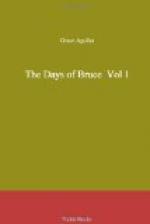“Aye,” answered Nigel, bitterly, “but with all Scotland crushed ’neath English chains, her king and his bold patriots fugitives and exiles, ourselves the only Scottish force in arms, the only Scottish castle which resists the tyrant, how may this be, whence may come increase of force, of store? Seaton Seaton, thine are bright dreams—would that they were real.”
“Wouldst thou then give up at once, and strive no more? It cannot be.”
“Never!” answered his companion, passionately. “Ere English feet shall cross these courts and English colors wave above these towers, the blood of the defenders must flow beneath their steps. They gain not a yard of earth save at the bright sword’s point; not a rood of grass unstained by Scottish blood. Give up! not till my arm can wield no sword, my voice no more shout ‘Forward for the Bruce!’”
“Then we will hope on, dream on, Nigel, and despair not,” replied Seaton, in the same earnest tone. “We know not yet what may be, and, improbable as it seems now, succors may yet arrive. How long doth last the truce?”
“For eighteen hours, two of which have passed.”
“Didst thou demand it?”
“No,” replied Nigel. “It was proffered by the earl, as needed for a strict examination of the traitor Evan Roy, and accepted in the spirit with which it was offered.”
“Thou didst well; and the foul traitor—where hast thou lodged him?”
“In the western turret, strongly guarded. I would not seek thy counsel until I had examined and knew the truth.”
“And thine own judgment?”
“Was as thine. It is an ill necessity, yet it must be.”
“Didst pronounce his sentence?”
Nigel answered in the affirmative.
“And how was it received?”
“In the same sullen silence on the part of the criminal as he had borne during his examination. Methought a low murmur of discontent escaped from some within the hall, but it was drowned in the shout of approbation from the men-at-arms, and the execrations they lavished on the traitor as they bore him away, so I heeded it not.”
“But thou wilt heed it,” said a sweet voice beside him, and Agnes, who had just entered the chamber, laid her hand on his arm and looked beseechingly in his face. “Dearest Nigel, I come a pleader.”
“And for whom, my beloved?” he asked, his countenance changing into its own soft beautiful expression as he gazed on her, “What can mine Agnes ask that Nigel may not grant?”
“Nay, I am no pleader for myself,” she said; “I come on the part of a wretched wife and aged mother, beseeching the gift of life.”
“And for a traitor, Agnes?”
“I think of him but as a husband and son, dearest Nigel,” she said, more timidly, for his voice was stern. “They tell me he is condemned to death, and his wretched wife and mother besought my influence with thee; and indeed it needed little entreaty, for when death is so busy around us, when in this fearful war we see the best and bravest of our friends fall victims every day, oh, I would beseech you to spare life when it may be. Dearest, dearest Nigel, have mercy on this wretched man; traitor as he is, oh, do not take his life—do not let thy lips sentence him to death. Wilt thou not be merciful?”




